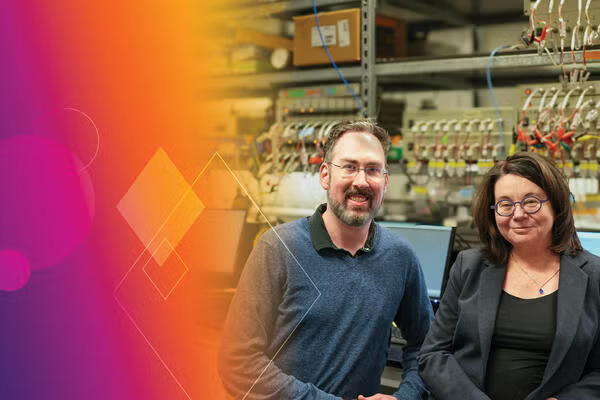
Stepping into a bold future
Introducing the 2025 Global Futures: Innovation Update

Introducing the 2025 Global Futures: Innovation Update
By Vivek Goel President and Vice-ChancellorHumanity is in a transformational period in history resulting in challenges that have never before been faced. Bold and curious pioneers are needed to find solutions that are acceptable, workable and scalable. Those who are willing to think differently, ask questions and challenge the status quo.
I have seen this bold spirit of curiosity at Waterloo, and it propels students, alumni and researchers to be the leaders and problem-solvers we need for our global future. They act with purpose to collaborate on innovative and sustainable solutions for humans and the planet.
I’m inspired by Waterloo’s unconventional students like Sarah Odinotski and Jack deGooyer who are pushing the boundaries of technology to advance what’s possible in health diagnostics. Imagine a camera that doesn’t miss anything, one sensitive enough to detect individual photons of light. It’s a future being built here at Waterloo. These Vanier Scholars are combining their different fields of study in nanotechnology and biomedical imaging to design a quantum camera that can accurately and quickly detect cancerous cells.
This collaborative approach to tackling real-world challenges is where discoveries are born. In the intersections between our global futures, Waterloo is thinking differently and working across disciplines to transform societies, health, economies, technologies and the environment.
As we think about big challenges, like scaling electric vehicles for impact, solutions lie within transforming current technologies, society and the economy. It’s a challenge that Dr. Linda Nazar from the Faculty of Science and Dr. Michael Pope from the Faculty of Engineering are working together to solve at Waterloo’s new Ontario Battery and Electrochemistry Research Centre. Not only are they developing sustainable lithium battery alternatives, but they’re also working to train the next generation of talent equipped to support this growing industry.
Waterloo was founded alongside business and community members to solve the most pressing local and global challenges of the time. I am filled with hope and pride that this tradition continues to attract and nurture a curious community of innovators working together to uncover solutions for the future.
Humanity may be standing at the edge of the unknown, but it is also standing on the precipice of tomorrow’s solutions. Who are the pioneers stepping towards those solutions? Waterloo is on it.

Read more
OBEC paves Canada's path to building a green economy and maximizing impact on both technological and economic development

Read more
Using menstrual products as a diagnostic tool could replace invasive Pap smears with a non-invasive alternative

Read more
Student startup MetaCycler BioInnovations collaborates with Dairy Farmers of Ontario to scale their research solution for plastic pollution
The University of Waterloo acknowledges that much of our work takes place on the traditional territory of the Neutral, Anishinaabeg, and Haudenosaunee peoples. Our main campus is situated on the Haldimand Tract, the land granted to the Six Nations that includes six miles on each side of the Grand River. Our active work toward reconciliation takes place across our campuses through research, learning, teaching, and community building, and is co-ordinated within the Office of Indigenous Relations.